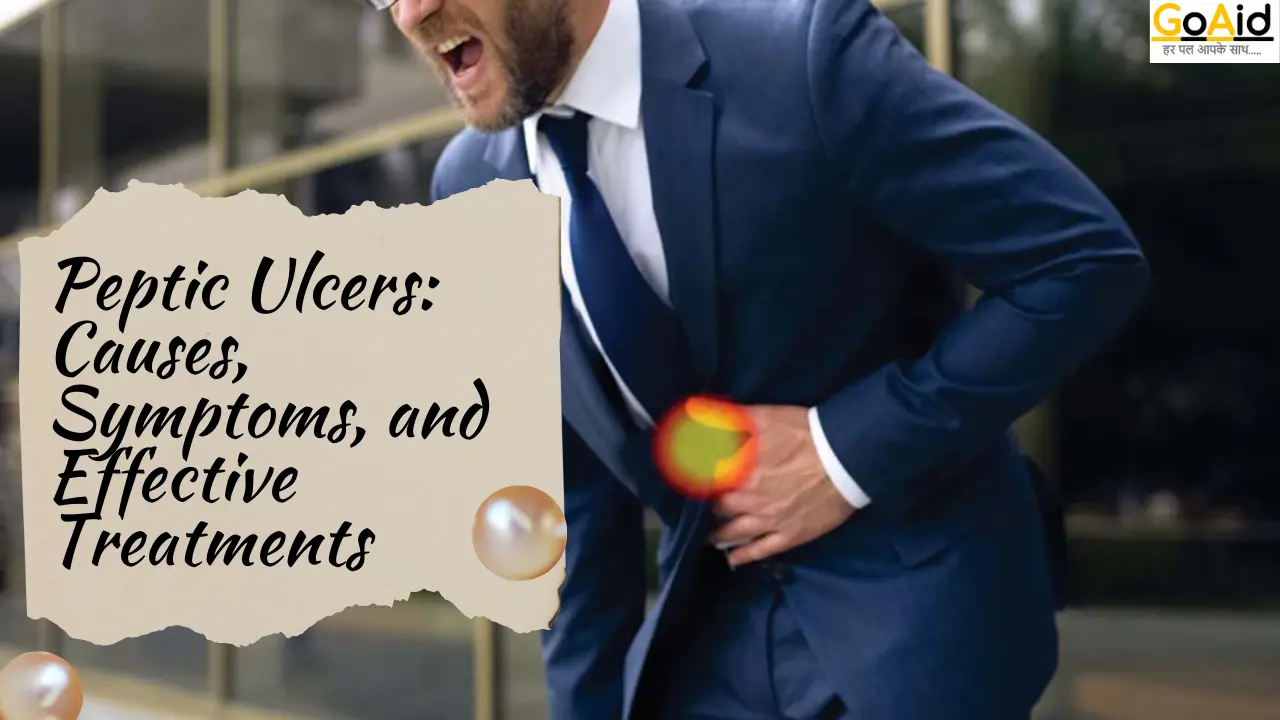Peptic ulcers are a common gastrointestinal condition that affects millions of people worldwide. This is so common in populated countries and this is why, not having the right treatment for Peptic Ulcer can cause many other harmful impacts on your body. This is why, we need to know about these types of most common diseases. This is why, in this blog, we have added comprehensive details about the Peptic Ulcer.
If you are also looking to learn about Peptic Ulcer in detail, then read this blog to the end. In this blog, we have added details about Peptic Ulcers, such as types of Peptic Ulcers, causes of ulcers, symptoms of ulcers, treatment of ulcers, and preventive measures for the Ulcer.
So, letŌĆÖs start
Complete details about the Peptic Ulcer: Causes, Treatment, and Prevention
We have provided the complete details about Ulcer below. Check every point to get better details about the Ulcer:
What is the Peptic Ulcer?
A peptic ulcer is an open sore that forms on the inner lining of the stomach, lower esophagus, or upper part of the small intestine. It occurs when the protective mucous layer is compromised, allowing stomach acid to damage the tissue.
This can lead to significant pain and discomfort, often requiring medical treatment to promote healing and prevent complications. Peptic ulcers are diagnosed through procedures like endoscopy and imaging tests, which help visualize the ulcers and assess their severity. Treatment typically involves medications to reduce stomach acid and promote healing.
Read More: What Is Cancer ? Symptoms, Signs, Types & Causes
Types of Peptic Ulcer
There are two types of Peptic Ulcer:
1. Gastric Ulcers:
- Location: Develop on the lining of the stomach.
- Explanation: These ulcers are more common in older adults. They can cause stomach pain shortly after eating, and may also lead to weight loss and loss of appetite due to discomfort during meals.
2. Duodenal Ulcers:
- Location: Form on the duodenum’s lining, the small intestine’s first part.
- Explanation: Duodenal ulcers are more common than gastric ulcers. They typically cause pain between meals or during the night, and the pain is often relieved by eating or taking antacids.
Main Causes of Ulcer
These are the main causes of Ulcer:
1. Helicobacter pylori Infection: – Cause of Ulcer
- A bacterial infection that damages the stomach lining.
- Increases susceptibility to ulcers.
2. Nonsteroidal Anti-Inflammatory Drugs (NSAIDs): – Cause of Ulcer
- Long-term use of NSAIDs like ibuprofen and aspirin.
- Causes irritation and inflammation of the stomach lining.
3. Excess Acid Production: – Cause of Ulcer
- Conditions like Zollinger-Ellison syndrome lead to the overproduction of stomach acid.
- High acid levels erode the protective mucous layer.
4. Lifestyle Factors: – Cause of Ulcer
- Smoking increases stomach acid and reduces mucous protection.
- Excessive alcohol consumption irritates and erodes the stomach lining.
5. Stress and Diet: – Cause of Ulcer
- Chronic stress and poor dietary habits can exacerbate ulcer formation.
- Spicy and acidic foods may aggravate symptoms.
Know More: How Much Oxygen Does a Human Need
Major Symptoms of Ulcer ŌĆō Ulcer Symptoms

These are some of the most known symptoms of ulcer:
1. Burning Stomach Pain: – key Ulcer Symptom
- A primary symptom of peptic ulcers is a burning or gnawing pain in the stomach area.
- This pain often occurs between meals or at night and may temporarily improve with eating or taking antacids.
2. Bloating: – key Ulcer Symptom
- Ulcers can cause a feeling of fullness or bloating in the abdomen.
- This symptom may lead to discomfort and a distended stomach.
3. Heartburn: – key Ulcer Symptom
- A burning sensation in the chest, often referred to as heartburn, can be a symptom of a peptic ulcer.
- This occurs when stomach acid refluxes into the esophagus.
4. Nausea: – key Ulcer Symptom
- Nausea and an uneasy feeling in the stomach are common symptoms.
- This can sometimes lead to vomiting, especially if the ulcer is severe.
5. Vomiting: – key Ulcer Symptom
- In more severe cases, ulcers can cause vomiting, sometimes with blood.
- Blood in the vomit can appear red or dark brown (resembling coffee grounds).
6. Dark, Tarry Stools: – key Ulcer Symptom
- Internal bleeding from an ulcer can cause stools to appear dark or black (tarry).
- This is a sign of bleeding in the upper gastrointestinal tract and requires immediate medical attention.
Read More: Complete Details About First Aid | Types, Benefits & Tips
7. Unexplained Weight Loss: – key Ulcer Symptom
- Severe or persistent ulcers can lead to a decrease in appetite and subsequent weight loss.
- Pain or discomfort associated with eating can contribute to this symptom.
8. Fatigue: – key Ulcer Symptom
- Chronic ulcers and the associated blood loss can lead to anemia, causing fatigue and weakness.
- This is due to the body’s reduced ability to carry oxygen in the blood.
9. Indigestion: – key Ulcer Symptom
- Persistent indigestion or dyspepsia is a common symptom of peptic ulcers.
- This includes discomfort, belching, and gas.
Ulcer Treatment Guidelines
These are some of the major guidelines that can be followed for ulcer treatment:
Medications: – Treatment of Ulcer
Proton Pump Inhibitors (PPIs): – Ulcer Treatment Method
- Drugs like omeprazole, esomeprazole, and lansoprazole reduce stomach acid production.
- They promote healing by allowing the ulcer to repair itself.
Also Read: Importance of Regular Health Check-Ups
H2-Receptor Antagonists: – Ulcer Treatment Method
- Medications like ranitidine and famotidine decrease acid production.
- They provide symptomatic relief and help heal the ulcer.
Antibiotics: – Ulcer Treatment Method
- Used to eradicate Helicobacter pylori infection.
- Common combinations include clarithromycin with amoxicillin or metronidazole.
Antacids: – Ulcer Treatment Method
- Over-the-counter options neutralize stomach acid and provide quick relief.
- They are used for symptomatic management but do not heal the ulcer.
Cytoprotective Agents: – Ulcer Treatment Method
- Medications like sucralfate and misoprostol protect the stomach lining.
- They create a protective barrier over the ulcer to facilitate healing.
Read More: Important Topics
Lifestyle Changes: – Treatment of Ulcer
Diet Modifications: – Ulcer Treatment Method
- Avoiding spicy, acidic, and irritating foods that can exacerbate symptoms.
- Eating smaller, more frequent meals to reduce stomach acid production.
Smoking Cessation: – Ulcer Treatment Method
- Quitting smoking helps reduce stomach acid and improves ulcer healing.
- Smoking also inhibits the effectiveness of ulcer medications.
Limiting Alcohol: – Ulcer Treatment Method
- Reducing or eliminating alcohol consumption can prevent further irritation of the stomach lining.
Stress Management: – Ulcer Treatment Method
- Engaging in stress-reducing activities like meditation, yoga, and exercise.
- Chronic stress can worsen ulcer symptoms and delay healing.
Surgical Intervention: – Treatment of Ulcer
Indications for Surgery: – Ulcer Treatment Method
- Reserved for severe cases or complications like bleeding, perforation, or obstruction.
- Surgery may be required if the ulcer does not respond to medication.
Also Read: What are the rules and Regulations of ambulance in India?
Types of Surgery: – Ulcer Treatment Method
- Vagotomy: Cutting the vagus nerve to reduce acid secretion.
- Partial Gastrectomy: Removing a portion of the stomach to reduce acid production.
- Pyloroplasty: Widening the opening of the duodenum to improve gastric emptying.
Follow-Up and Monitoring: – Treatment of Ulcer
Regular Check-Ups: – Ulcer Treatment Method
- Follow-up appointments to monitor healing and adjust treatment as necessary.
- Endoscopy may be repeated to ensure the ulcer is healing properly.
Testing for H. pylori: – Ulcer Treatment Method
- Post-treatment testing to confirm the eradication of Helicobacter pylori.
- Ensures the infection is fully cleared to prevent recurrence.
Alternative Therapies: – Treatment of Ulcer
- Probiotics:- Ulcer Treatment Method
- May help restore gut flora balance and support ulcer healing.
- Herbal Remedies: – Ulcer Treatment Method
- Some herbs like licorice root and aloe vera are believed to have soothing effects on the stomach lining.
- Should be used with caution and under the guidance of a healthcare professional.
Also Read: Introduction to All Details about Heart Care
Prevention of Ulcer ŌĆō Prevention Tip for Ulcer
These are a few effective prevention tips for the prevention of ulcers:
1. Avoid Long-Term Use of NSAIDs: Ulcer Prevention Tip
- Limit the use of nonsteroidal anti-inflammatory drugs (NSAIDs) like ibuprofen and aspirin.
- If necessary, use the lowest effective dose for the shortest duration possible.
- Consider alternative pain relief options, such as acetaminophen, which is less likely to cause ulcers.
2. Manage Helicobacter pylori Infection: Ulcer Prevention Tip
- Get tested for H. pylori if you have symptoms of an ulcer or a family history of ulcers.
- Complete the full course of antibiotics if diagnosed with an H. pylori infection.
- Regular follow-up testing to ensure the infection is eradicated.
3. Adopt a Healthy Diet: Ulcer Prevention Tip
- Eat a balanced diet rich in fruits, vegetables, and whole grains.
- Avoid foods that irritate your stomach, such as spicy, acidic, and fatty foods.
- Limit caffeine and alcohol intake, as they can increase stomach acid production.
4. Quit Smoking: Ulcer Prevention Tip
- Smoking increases stomach acid and weakens the protective lining of the stomach.
- Seek support from smoking cessation programs, medications, or counseling to quit.
5. Limit Alcohol Consumption: Ulcer Prevention Tip
- Excessive alcohol can erode the stomach lining and increase acid production.
- Moderation is keyŌĆölimit alcohol intake or avoid it altogether if you have a history of ulcers.
Know More: Hospital Department List: Everything You Need to Know
6. Manage Stress: Ulcer Prevention Tip
- Chronic stress can increase stomach acid production and exacerbate ulcer symptoms.
- Practice stress-reducing techniques such as meditation, yoga, deep breathing exercises, and regular physical activity.
- Ensure adequate rest and sleep to support overall health.
7. Use Medications Wisely: Ulcer Prevention Tip
- If you need to take NSAIDs, use them with caution and under medical supervision.
- Consider taking protective medications, such as proton pump inhibitors (PPIs) or H2-receptor antagonists, if you are at high risk of ulcers.
8. Practice Good Hygiene: Ulcer Prevention Tip
- Wash your hands regularly to prevent infections, including H. pylori.
- Ensure food and water are properly prepared and handled to avoid contamination.
Book Ambulance: GoAid Ambulance Service
Conclusion to the Peptic Ulcer
In Conclusion, Peptic ulcers, painful sores in the stomach or small intestine, can significantly impact one’s quality of life. Understanding the types of ulcers, causes of ulcers, ulcer symptoms, ulcer treatment options, and prevention tips for ulcers is crucial for effective management and recovery.
By adopting healthier lifestyle habits, seeking timely medical advice, and adhering to prescribed treatments, individuals can successfully manage and prevent ulcers. We have provided you with comprehensive information on peptic ulcers, including symptoms, causes, treatment options, and prevention tips. If you have any further questions, feel free to ask in the comment box.
FAQs related to the Peptic Ulcer
The fastest way to cure a stomach ulcer involves a combination of medications prescribed by a healthcare provider. This typically includes proton pump inhibitors (PPIs) to reduce stomach acid, antibiotics to eradicate Helicobacter pylori infection, and lifestyle changes like avoiding NSAIDs, reducing alcohol consumption, quitting smoking, and eating a balanced diet. Following your doctor’s advice and completing the full course of treatment is essential for rapid and effective healing.
While stress alone is not a direct cause of peptic ulcers, it can exacerbate symptoms and slow the healing process. Chronic stress may increase stomach acid production and weaken the protective lining of the stomach, making it more susceptible to damage from acid and Helicobacter pylori infection.
Yes, certain foods can support the healing of peptic ulcers. Foods rich in fiber, such as fruits, vegetables, and whole grains, can promote a healthy digestive system. Additionally, probiotics found in yogurt and fermented foods can help restore gut balance. Avoiding spicy, acidic, and fatty foods can also prevent irritation and aid in the healing process.
The healing time for a peptic ulcer varies depending on its severity and the effectiveness of treatment. With proper medical care, including medications and lifestyle changes, most ulcers begin to heal within a few weeks. Complete healing can take up to 6-8 weeks, but some cases may require longer treatment.
Yes, peptic ulcers can recur, especially if the underlying causes are not addressed. Factors such as continued use of NSAIDs, Helicobacter pylori reinfection, smoking, and excessive alcohol consumption can lead to recurrence. Adhering to preventive measures and regular medical follow-ups can help reduce the risk of recurrence.















